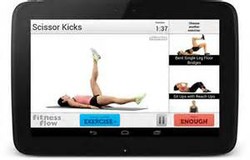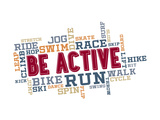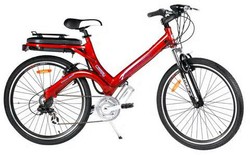Are you fit? Do you exercise? Do you utilize computer ‘apps’ or games to help you stay in shape? If you answered yes to any of these questions how do you know the apps or games you use are any good at really helping you lose weight or stay in shape? Sure, the end results will help answer the question. If your experience leads to better health, lost weight or some other benefit you seek then perhaps the app or game helped. Then again, maybe it was your effort and determination that got you to your goal with little real assistance from the app?

Fitness Apps – Are They Helpful?
Fitness apps and games are a multi-billion dollar industry, but will they work for you?
Recently, scientists at Brigham Young University tackled this question by analyzing more than 2,000 health and fitness apps. They found that the vast majority of apps use some kind of game – they call it ‘gamification’ – to motivate the user. They took close looks at apps/games such as Zombies, Run!, Pact, Fitbit, and DietBet.
How popular are health and fitness apps? The researchers say there are more than 31,000 of them on the market today and the number is growing. In fact, there are so many on the market that it is nearly impossible for anyone or any research entity to examine them all to determine if they really help or if they are even the best way to exercise. In many cases, such as weight loss, success means changing behaviors and doing so permanently. Many exercise apps, especially games, are fun to use in the short term but there is little research on whether users keep using them to modify their existing and exercise issues.
It’s All About Changing Behavior
The researchers found that the game type applications often ignore key elements of behavioral change and could even work to lessen a person’s motivation. For example, if using the app over time starts to be a chore and/or the game rewards become repetitive or less interesting the motivation to keep using them also lessens.
According to the BYU study, people need to have strong motivation to change and to learn particular skills that will help them achieve goals. They found the most common form of motivation is social or peer pressure (45 percent of the apps they studied included this feature), followed by digital rewards (24 percent), competition (18 percent), and leaderboards where you compare your progress with others (14 percent).
Also, the games or apps notwithstanding, if a person lacks motivation to be and stay healthy they are less likely to achieve the success they seek. The researchers expressed doubt that games/apps can do this, and they in fact may give users unrealistic expectations about what they can do for people.
Billion Dollar Industry
But, with so many games, apps and other fitness and health related gizmos and programs out there – after all the industry is expected to hit the $2.8 billion mark by 2016 – how is one to decide what is best? Unfortunately, there is no shortage of ‘best’ lists when it comes to health and fitness. And, the field is changing so quickly that what may be ‘best’ today may be at the bottom of the list tomorrow. While there are no perfect strategies (you have to determine what works best for you), there are some guidelines to consider.
1. Get real! If you are depending on an app to lead you from obese to oh wow in a few weeks, you’d better think again. If you are serious about this, make this a long-term goal. This will probably be a life-style change for you and it can’t be done quickly.
2. Get a check up. If your exercise routine right now consists of a brisk walk from your couch to the refrigerator and you haven’t seen a doctor or gotten a check up since you were in diapers, you know what you need to do before you launch into any rigorous exercise regimen with or without an app.
3. Diet. All the exercise in the world – or the apps that help you – isn’t going to make any difference if your caloric intake is greater than your caloric output. If you don’t modify what got you into bad shape in the first place – and food is usually a main culprit – then you’ll find yourself on a treadmill to nowhere. And starving yourself isn’t the answer either. A good nutritional plan is a must and there are plenty of programs out there to help you. Talk to a dietician if you must.
4. As far as apps go, avoid the ones that promise too much. If an app promises you a specific weight loss in a specific amount of time, forget about it. If an app doesn’t say that its exercise program must include good eating habits, move on. A ‘four-minute’ workout? No way. If it were that simple everyone would be in perfect shape.
5. If you are considering an app, do some homework. Has the developer ever created an exercise or health app before? What are their credentials in the fields of exercise or nutrition?
6. Consider apps that can truthfully say they are based on research – and not on research from some institution you’ve never heard of or can’t find online. Check out reviews of the app. How many people have bought/used it? What medical professionals have weighed in on it?
7. Take it for a test spin. Many quality games/apps – especially online versions – will let you test it out before committing to buy it. If it’s a handheld or wearable version see if any of your friends have used it and ask if you can borrow it. Look and see how clear the instructions are and how convenient it is to use.
8. Take your time. Rome wasn’t built in a day and the results you seek will also take time.
9. Don’t be discouraged. It’s not unusual to make rapid progress at the beginning but find the progress not so rapid later on. That’s where your own motivation and determination come into play. This is a marathon, not a sprint.
10. It’s okay to give yourself a pat on the back for the progress you’ve made. For some maybe that’s a new dress or maybe a nice dinner out – even with dessert. Getting fit and healthy isn’t supposed to be a jail sentence with no visiting privileges.
The idea of getting fit and staying that way is all about commitment. Games, apps and other ways of assisting you in achieving your goals are tools. The best app is the one that lies between your ears.
You might also like
The History of the Cold and How Some Remedies Could Make You SickThe history of some ubiquitous products go back to the time of the Egyptian P...
Is An Eco-Friendly Electric Bike For You?Electric bikes are growing in popularity. Is one right for you? If so, there ...











 The Problem With Wizzley and Amazon Associateson 10/17/2014
The Problem With Wizzley and Amazon Associateson 10/17/2014
 Happy Wife, Happy Life: Is It True?on 10/02/2014
Happy Wife, Happy Life: Is It True?on 10/02/2014
 Arborsculpture Designs Are Beautiful And Practicalon 09/30/2014
Arborsculpture Designs Are Beautiful And Practicalon 09/30/2014
 The Religious And Immoral Actson 09/23/2014
The Religious And Immoral Actson 09/23/2014



Comments
Revisiting your wizzley called to mind a question that I'd meant to ask after the first reading.
The BYU study describes motivators as social or peer pressure, then digital rewards, then competition and finally leaderboards for comparative progress. Did the fitness app study results correlate with those motivators?
I wonder if there ever has been a study that examines whether such motivators are carved in stone or changeable?
TheWritingCowboy, What are the digital rewards that the BYU study explores?
I had a couple of these types of app along with a pedometer and eventually a Nike+. I kept track of everything, steps, food, exercise, but I didn't lose weight. The weight didn't come off until I focused on actually doing the word required to drop pounds! The app did let me see my progress, keeping track of things going back a year or so.
I wear a pedometer almost every day, to do my 10,000 steps, but use an app on my 'phone when I forget it, or the battery runs out. The only trouble is that, whereas I set my pedometer to the right step length so it's accurate, apps aren't always. I deleted one for that very reason.